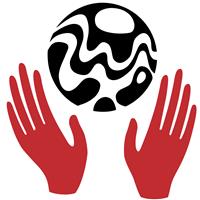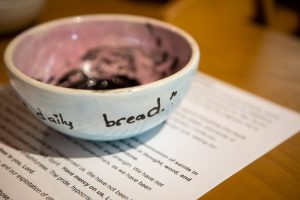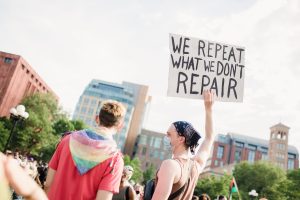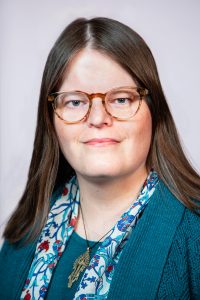Following are updates shared from submissions of the Lutheran Office for World Community and state public policy offices.
As the new year begins, these state public policy offices (SPPO) share their annual policy priorities. Find a map and full list of ELCA affiliated SPPOs using our state office map.
Learn more about Lutheran advocacy using our new resource, Advocacy 101 For Young Adults
U.N. | Arizona | Colorado | Florida | New Mexico | Ohio | Pennsylvania | Texas | Virginia | Washington | Wisconsin
UN
Lutheran Office for World Community, United Nations, New York, N.Y. https://www.elca.org/lowc –Dennis Frado, Director
Changed US policy approach to Israel-Palestine outlined at UN Security Council: At the January monthly discussion of the Israel-Palestinian conflict in the UN Security Council, Acting U.S. Representative Richard Mills outlined how the Biden Administration plans to address the issues.
Ambassador Mills reiterated earlier US policy of support for a “mutually agreed two-state solution, one in which Israel lives in peace and security alongside a viable Palestinian state.” He said that approach “remains the best way to ensure Israel’s future as a democratic and Jewish state, while upholding the Palestinian people’s legitimate aspirations for a state of their own and to live with dignity and security.”
“President Biden has been clear in his intent to restore U.S. assistance programs that support economic development and humanitarian aid for the Palestinian people and to take steps to re-open diplomatic missions that were closed by the last U.S. administration,” Mills added.
Arizona
Lutheran Advocacy Ministry Arizona, https://www.lamaz.org – Solveig Muus, Director
In January, the LAMA policy council identified its legislative policy priorities for Arizona in 2021, the Fifty-fifth Legislature, First Regular Session as below:
- Hunger and associated food security issues
- Community-based senior support
- Fair and Equitable distribution of COVID-19 vaccines
LAMA is currently tracking 65 bills that were introduced in January, bills the policy council believes are of interest to people of faith in Arizona. Between the two houses, there are 17 bills on child and youth welfare, 12 on housing and homeless issues, 10 related to civil rights, eight on food security, seven on voting, seven on health care, six on issues of concern to vulnerable adults, etc. In addition to the bills related to our specified policy priorities, we also are watching movements on voting rights, redistricting, vaccine hesitancy and more.
Together with its partner, Lutheran Social Services of the Southwest (LSS-SW), LAMA sponsored Advocacy 101, and is collaborating with Arizona Faith Network and Bread for the World on a second training session in February. This virtual workshop educates participants on the Arizona Legislature and introduces them to Arizona’s Request To Speak (RTS) bill-tracking system. LAMA’s plans to continue encouraging Arizona Lutherans to sign up for RTS, as it is a super-easy, free way to weigh in and be heard on a bill from the comfort of your home. Or… when times are better, to speak in person at the legislature.
Colorado
Legislature gavels in, recesses: The Colorado General Assembly officially gaveled in their 2021 legislative session on Wednesday, January 13th. Two days later, they went into recess until at least February 16th. As the pandemic continues, legislators will allow the peak of the post-holiday season to hopefully recede before convening to take up the work of the people.
Lutheran Advocacy Ministry-Colorado will be advocating for bills related to housing, tax credits, and support for people interacting with the criminal justice system, in addition to any follow-on work from ballot measures that passed in November 2020, such as paid family leave.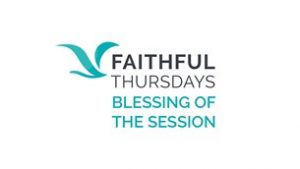 Blessing of the session: Lutheran Advocacy, along with several ecumenical and interfaith cosponsors comprising the Faithful Thursdays team, will be hosting a “Blessing of the Session” on Thursday, February 18 at 12 PM MT. Everyone is welcome at this online blessing! Please register in advance at www.faithfulthursdays.org.
Blessing of the session: Lutheran Advocacy, along with several ecumenical and interfaith cosponsors comprising the Faithful Thursdays team, will be hosting a “Blessing of the Session” on Thursday, February 18 at 12 PM MT. Everyone is welcome at this online blessing! Please register in advance at www.faithfulthursdays.org.
Florida
Florida Faith Advocacy Office, Florida Council of Churches https://floridachurches.org/advocacy/ – Russell L. Meyer, Executive Director
The Florida legislature is in its committee weeks leading up to the opening of the 60-day legislative session beginning March 2. The governor’s top priority is HB1/SB484. Known as the anti-peaceful protest bill, it ‘felonizes’ those who act violently while exercising their First Amendment right to assemble and present grievances and increases existing penalties for related offenses. The governor proposed the legislation last fall to contain overwhelming peaceful protests for racial justice, but now claims it is needed because of the Jan. 6 insurrection. Considered unconstitutional and unnecessary, the impact of the bill falls heaviest on Black and Latinx Floridians seeking civil rights. Although advanced by party line vote, privately many lawmakers say they would rather focus on addressing the pandemic and the economy. Encourage legislators to protect civil liberties and pursue real solutions to actual problems.
SB48 consolidates voucher scholarships into an ongoing trust fund, automatically increases the number of scholarships annually, and includes them in the formula for funding public schools. Yet private and charter schools do not have to meet the standards of public schools. Public school funding decreased 30% between 2008-2018, while tax revenue was diverted to voucher scholarships. Across the state, school districts have passed sales tax referendums to make up for cuts in state dollars. Florida needs to fund public schools fully so all students can thrive.
Florida spends over $3 billion per year to incarcerate nearly 100,000 inmates and is the only state without parole. Several reform bills are proposed.
New Mexico
1st Session of the 55th Legislature is underway: The New Mexico Legislature gathers in Santa Fe on the third Tuesday in January of each year. The Legislature meets for 60-day sessions in odd-numbered years and 30 days in even-numbered years. The Capital, known as the “Roundhouse” remains closed to the public with the session being conducted entirely online.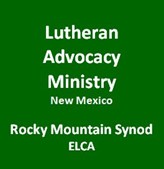
As the session continues to progress, legislators, citizens, lobbyists, and advocates have become more comfortable and adept at conducting business through Zoom, as is evident by the less frequent question, “Can you hear me?” Meeting virtually has major shortcomings, such as the lack of face-to-face advocacy, and yet advantages exist as well. Citizens are participating from communities large and small, rural and urban, all across the state and virtual committee rooms allow for far great attendance. Chairs of committees have consistently remarked that there are more participants in their virtual meeting room than could fit in their Capital meeting rooms. Also, LAM-NM can be present and participate in more than one committee meeting at a time.
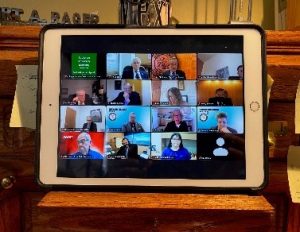 LAM-NM is equipping our Advocating Congregations and volunteer advocates by providing three training sessions on advocating virtually, and by holding Sunday afternoon mini-legislative updates where experienced volunteers are prepared for upcoming committee testimony. Unable to meet in person, the annual half-day Issuing Briefing will be held virtually on February 25th, and the Bishop’s Luncheon has been postponed for 2021.
LAM-NM is equipping our Advocating Congregations and volunteer advocates by providing three training sessions on advocating virtually, and by holding Sunday afternoon mini-legislative updates where experienced volunteers are prepared for upcoming committee testimony. Unable to meet in person, the annual half-day Issuing Briefing will be held virtually on February 25th, and the Bishop’s Luncheon has been postponed for 2021.
Ohio
Hunger Network in Ohio https://www.hungernetohio.com – Nick Bates, Director
The Budget is here! The Governor introduced his budget proposal on February 1st. He introduced a very ordinary budget for extraordinary times. The budget maintains status quo funding for most programs and agencies.
- Create a refundable Earned Income Tax Credit (EITC): This will place money into the pockets of low- and middle-income workers – especially those who have had hours cut or lost their job during the pandemic.
- Invest in the Ohio Housing Trust Fund: Our Housing Trust Fund invests into weatherization, homeless services, and affordable housing programs. As we look to build up healthy communities – we need safe, decent, and affordable housing.
- Strengthen our food banks: With an estimated 40% increase to hunger in Ohio during the pandemic, we need to make sure our food banks can continue meeting the needs of hungry Ohioans by buying surplus produce from Ohio farmers.
- Fix School Funding: No longer should a student’s zip code determine their educational opportunities. It is time to pass the bi-partisan agreements to fix school funding in Ohio.
STOP SB 17: The Hunger Network has joined with other advocates in opposition to SB17 which will hurt hungry Ohioans. This legislation will cause confusion in the checkout line for families using SNAP benefits and puts paperwork over people for Medicaid, SNAP, and other services. County offices will be overwhelmed with tracking requirements that will not benefit Ohio or hungry families.
Other upcoming Events:
– Prayers for Ohio elected officials March 4 @ 3pm
– Budget briefing Feb 18 @ 3pm
– Joint Council of Churches Advocacy Day, March 23 @ 9am
Pennsylvania
Lutheran Advocacy Ministry- Pennsylvania (LAMPa) https://www.lutheranadvocacypa.org/ – Tracey DePasquale, Director
Before the insurrection in the nation’s capital, Pennsylvania’s Capitol was the scene of turmoil that included the ouster of a presiding officer and refusal to seat a lawmaker at the start of a new session of the General Assembly, signaling heightened partisan tensions. Nonetheless, LAMPa advocates sought bipartisan support for relief for the most vulnerable – particularly related to rent, utilities, and food.
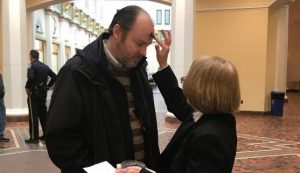 LAMPa said farewell but not goodbye to Program Director Lynn Fry, who began work with United Lutheran Seminary after three years of dedication to the ministry of advocacy.
LAMPa said farewell but not goodbye to Program Director Lynn Fry, who began work with United Lutheran Seminary after three years of dedication to the ministry of advocacy.
Staff continued to archive more than four decades of LAMPa’s history, even as they and policy council members innovate for more nimble response to need and greater connection with the service of lay and rostered leaders for advocacy rooted in relationship.
Teaching/Serving the Wider Church: Hunger Advocacy Fellow Larry Herrold helped lead a presentation “Getting Started With ELCA Advocacy” for the ELCA World Hunger Leadership Gathering. His devotional “Identification Beyond Binaries” appeared as an ELCA Advocacy blog in January.
Director Tracey DePasquale participated in the second meeting of the task force developing the ELCA Social Statement on Government and Civic Engagement. She also participated in a panel discussion on advocacy in the ELCA for Dr. Cynthia Moe-Lobeda’s class on Faith-Rooted Social Transformation at Pacific Lutheran Theological Seminary.
DePasquale helped lead the Pennsylvania Prayer Service for Christian Unity and participated in the priority-setting meeting of the Penn. Council of Churches Commission for Public Witness on behalf of Pennsylvania’s ELCA synods.
Texas
The Texas Legislature convened their biennial Legislative Session in January, and Texas Impact immediately began resourcing Texans of faith to engage in the process.
The Interfaith Service of Public Witness, which featured ELCA Bishop Sue Briner among other Texas faith leaders, kicked off the session before concluding the month with the virtual four day United Methodist Women’s Legislative Event, with some Lutherans among the 400 attendees. The Legislative Event was a successful test-run for the virtual Texas Interfaith Advocacy Days scheduled for March 6-9.
Due to COVID-19 restrictions, online engagement will be more important than ever. To help equip members and congregations, Texas Impact created a “Twitter for Advocacy” series and encouraged members to interact with their representatives online.
Texas Impact continues to recruit Rapid Response Team members to make time-sensitive calls and Legislative Engagement Group members who commit to meeting and partnering with other advocates in their Texas House district to plan and prepare for monthly meetings with their representative and/or staff.
The Weekly Witness podcast during the Legislative Session features a Texas faith leader providing a “Weekly Word,” a guest advocate discussing the “issue of the week” and Texas Impact staff providing a legislative update and action alert. January episodes had record numbers of listeners during the live Zoom recording and in downloads for the month.
In addition, Texas Impact staff have been invited to present at several congregational events as they increase capacity for online programming. Texans of faith are mobilizing in exciting ways to participate with their representatives during this important season of democracy.
Virginia
January is a very busy month for the Virginia Interfaith Center for Public Policy (VICPP) because it is the first month of the very short General Assembly, which normally lasts only 45 days in the short session. VICPP’s top legislative priorities have all made it through at least one legislative body and are moving through the second one in February. Bills that have proceeded out of at least one legislative body:
- Abolition of the Death Penalty (passed both House and Senate)
- Paid Sick Days for Essential Workers (passed House)
- Minimum Wage for Farmworkers (passed House)
- Environmental Justice Act (passed both House and Senate)
- Water as a Human Right Resolution (passed House)
- Transportation Equity Study (passed House)
In addition, we have been working on a budget amendment to get prenatal care for immigrant women.
VICPP normally holds an Advocacy Day in January. This year it was a virtual advocacy week that drew 416 participants to four plenaries, 12 workshops, dozens of legislative visits and five prayer vigils around the Commonwealth.
Anyone in Virginia who wants to get more involved in advocating justice in the Commonwealth can sign-up at https://www.virginiainterfaithcenter.org/email-list/.
Washington
Faith Action Network https://www.fanwa.org/ – Paul Benz and Elise DeGooyer, Co-Directors
Eastern Washington Legislative Conference: FAN hosted our virtual Eastern WA Legislative Conference on January 30 with over 165 people in attendance. We heard from Rev. Walter Kendricks, pastor of Morning Star Baptist Church in Spokane, how we can move “beyond words to do justice”, with a panel discussion and breakout groups following. Advocates then met in workshops by issue topic and heard an update f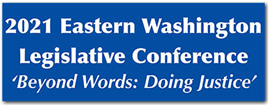 rom advocacy organizations about the 2021 legislative session. We finished the day with a virtual tabling fair. Thanks to our partners The Fig Tree, Catholic Charities, Earth Ministry, and the Sisters of St. Francis of Philadelphia for helping make this a great virtual event!
rom advocacy organizations about the 2021 legislative session. We finished the day with a virtual tabling fair. Thanks to our partners The Fig Tree, Catholic Charities, Earth Ministry, and the Sisters of St. Francis of Philadelphia for helping make this a great virtual event!
Interfaith Governor’s Meeting: FAN hosted our annual interfaith meeting with the Governor on February 8, with 20 faith leaders from various traditions in attendance, including all three Synod ELCA Bishops! We discussed issues and bills related to COVID vaccinations, revenue, the Working Families Tax Credit, police reform, housing, the environment, and banning credit scoring in the insurance industry.
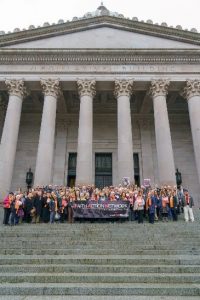 Upcoming Interfaith Advocacy Days: FAN is getting ready for our first virtual Olympia-focused Interfaith Advocacy Day on February 11. The structure of our program will be very similar to our in-person events, with opening statements by interfaith leaders and state legislators, a legislative overview, caucus meetings by legislative districts, and workshops on bills from our legislative agenda. Legislator appointments will happen on Thursday and Friday. We look forward to bringing the voices of over 200 advocates to the virtual halls of power!
Upcoming Interfaith Advocacy Days: FAN is getting ready for our first virtual Olympia-focused Interfaith Advocacy Day on February 11. The structure of our program will be very similar to our in-person events, with opening statements by interfaith leaders and state legislators, a legislative overview, caucus meetings by legislative districts, and workshops on bills from our legislative agenda. Legislator appointments will happen on Thursday and Friday. We look forward to bringing the voices of over 200 advocates to the virtual halls of power!
In Central WA, we will gather on February 20 for Advocacy Day, Moving Past Crisis and Into Action, for a morning of legislative overview, a panel discussion on policies affecting immigrants, and breakout action groups on Poverty, Climate, Redistricting, Healthcare, and Immigration. We will emphasize collective actions we can take to move policies forward, both locally and at the state level.
Wisconsin
Lutheran Office for Public Policy in Wisconsin (LOPPW) https://www.loppw.org/ – Cindy Crane, Director
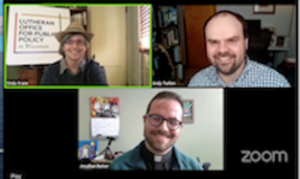 Wednesday Noon Live: Updates on a resolution to eliminate Wisconsin’s mask mandate and its connections to FoodShare, and a Wisconsin COVID bill, plus an interview with Rev. Jonathan Barker, Kenosha, and his fasting for climate justice.
Wednesday Noon Live: Updates on a resolution to eliminate Wisconsin’s mask mandate and its connections to FoodShare, and a Wisconsin COVID bill, plus an interview with Rev. Jonathan Barker, Kenosha, and his fasting for climate justice.
Care for God’s Creation: Our March 18th virtual advocacy event now has a keynote speaker, Lt. Governor Barnes. Other speakers include Lutherans Restoring Creation Executive Director Phoebe Morad and Chief Meteorologist Bob Lindmeier. We will begin at 10 AM. Length TBA.
Criminal Justice: Kyle has created a website for the Raise the Age Coalition. He continues to lead the whole coalition and one of the workgroups, while participating in the other two workgroups he helped to organize. He also has made individual contacts with key leaders from the Michigan Raise the Age Coalition that successfully helped to return 17-year-old youth to the juvenile justice system in their state. Cindy is part of the legislative workgroup.
State Budget: Governor Evers will release his biennial state budget on Feb. 16. LOPPW belongs to two coalitions that discern and strategize responses to the budget.
LOPPW’s Priorities for 2021 include the following:
- Calling for an End to Hunger
- Addressing the Crisis of Human Trafficking
- Caring for God’s Creation
- Supporting Immigration Reform
- Calling for Criminal Justice Reform (focused on juvenile justice)
We view all our priorities through a lens of food and racial equity. We also continue to pay attention to voting issues via a statewide voting coalition.



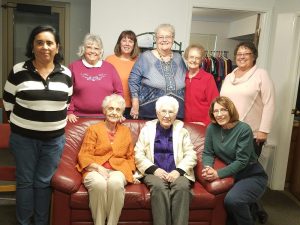













 the Lutheran School of Theology at Chicago focusing on womanist theology, race, and history. Denise was a member of the Liturgy Working Group for
the Lutheran School of Theology at Chicago focusing on womanist theology, race, and history. Denise was a member of the Liturgy Working Group for 